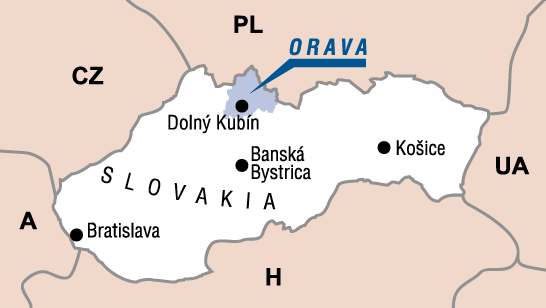Home
Background
Background
Oravecz, Oravec, Oravetz,
Oravets, Oravez, Oravis, and Orawetz
|
|
The meaning of the name Oravecz or Oravec is 'Orava person.' Originally, the name would have been used prior to the permanent adoption of last names (surnames). In a region outside of Orava, the person using Oravec as their designation would be indicating that they were originally from the Orava region. The Orava region is located in northern Slovakia and shares its northern border with Poland. Orava is a relatively hilly and secluded region surrounded by mountain belts from all sides. The Orava river is located in the Orava region.
Although Oravec(z) is considered to be a difficult and unusual name in the US, it is a fairly common name in and around Slovakia. Slovaks consider it to be a good Slovak name.
The Oravecz name has several variants. The geographical center for the name is the region that now includes Slovakia and northeastern Hungary. There is also a large group in the US as a result of emigration from this area of Europe, especially eastern Slovakia. The Oravecz variant is now mostly found in Hungary and the US. Many Hungarian family names retain the traditional cz spelling even though the pronunciation is equivalent to the c ending. The Oravetz variant is also mostly found in the US and in Hungary. The Oravec variant is mainly found in Slovakia and the US. In Slovakia, the more modern c ending has displaced the traditional cz used in Hungary. The Oravets, Oravez, and Oravis variants appear to be anglicized versions of the Oravecz, Oravetz, and Oravec original forms. These variants appear to be associated largely with the US. The Orawetz variant appears to be a variation adapted to the German alphabet.
Adapting the Oravecz name to English is not too difficult because the letters in the Orave root correspond closely to the English equivalents. Also, the original Oravecz, Oravetz and Oravec forms do not use diacritical marks. The main difficulty is the ending sound represented by the cz, tz, or c, . In both Slovak and Hungarian, the c and cz endings correspond to a ts sound as in bats and hats. The tz ending sounds similar since the t and z sound much like they do in English. The use of ts, z, and s in the corresponding anglicized variants is an attempt to more closely represent the original pronunciation using the English alphabet. The original pronunciation would follow the Slovak and Hungarian. In these languages, a slight but perceptible stress is always placed on the first syllable, O, instead of the second syllable, ra, as is most common in English. The r is trilled or rolled, as in Scottish English. Finally, the a sounds like ah or like a in what.


